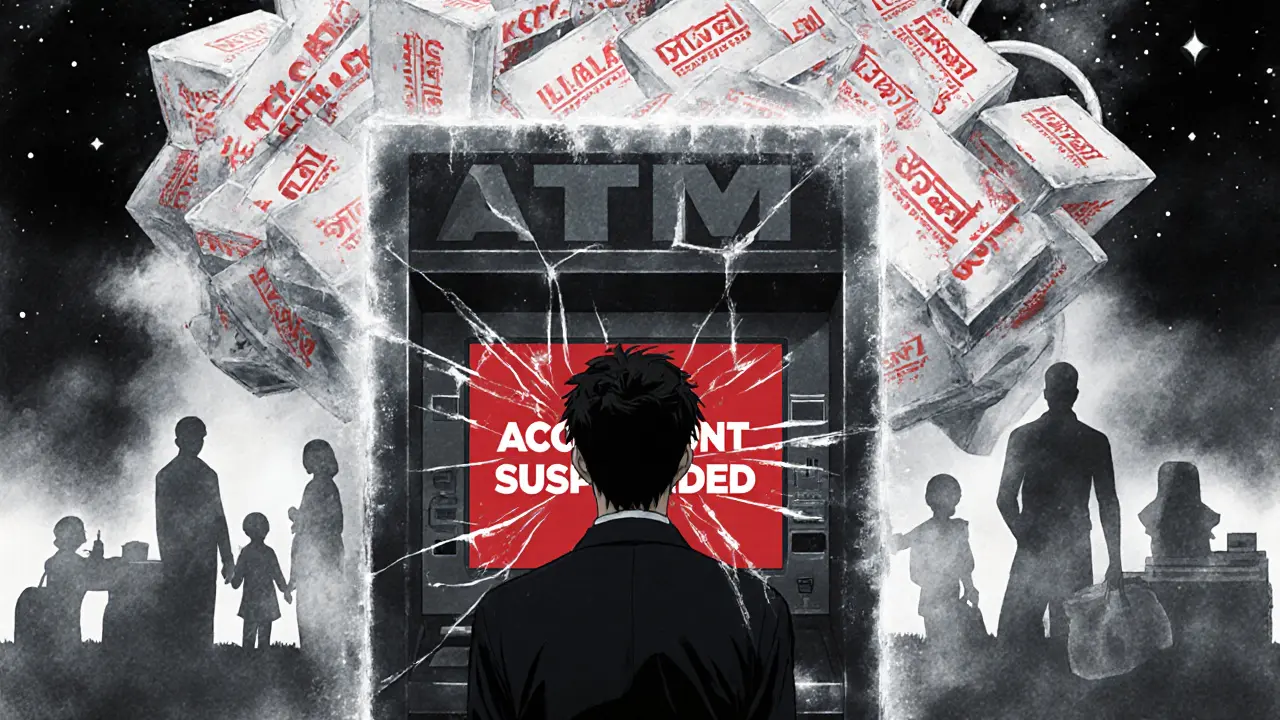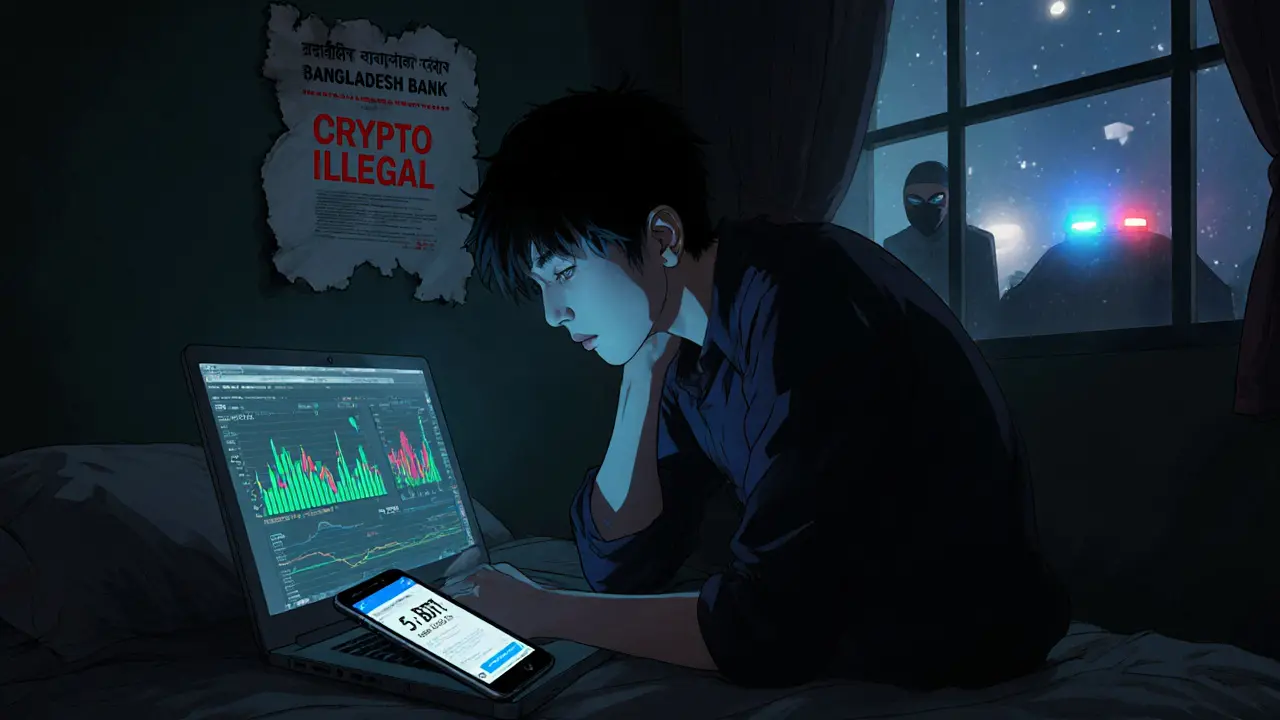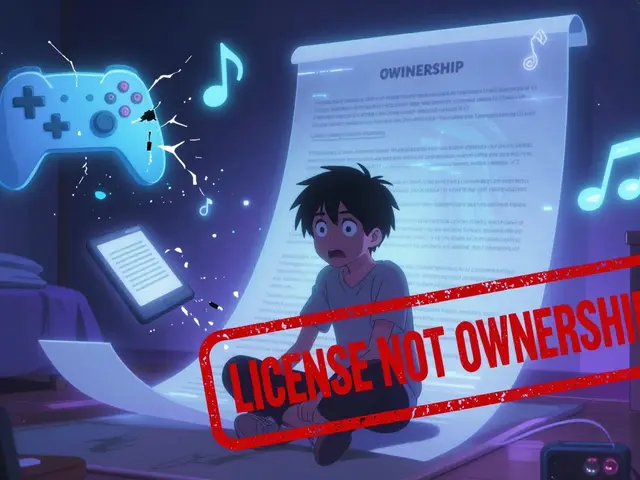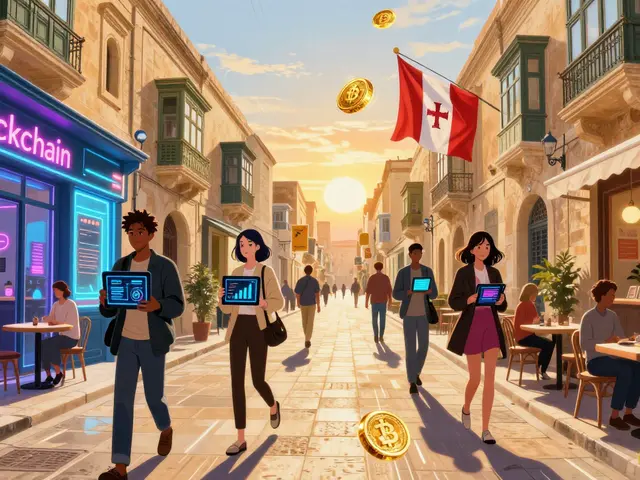Crypto Risk Calculator for Bangladesh
This tool calculates the potential risks associated with cryptocurrency trading in Bangladesh based on current laws and enforcement practices. The government has strict penalties for crypto activities, and this calculator helps you understand the real consequences.
Trade Information
Risk Assessment
Based on the information you provided, here's what you need to know:
Results
Enter your trade information above to see the calculated risks.
Buying Bitcoin or trading USDT in Bangladesh isn’t just risky-it’s illegal. And yet, thousands of people still do it every day. Why? Because the money’s there, the banks won’t help, and the underground network is easier than you think. But what happens when the police knock on your door? Or your agent disappears with your life savings? Or your bank freezes your account because they found a $5,000 transfer to a foreign exchange? This isn’t speculation. It’s happening right now.
It’s Not Just Against the Rules-It’s a Crime
The Bangladesh Bank banned all cryptocurrency activity in 2017. That means buying, selling, holding, mining, or even receiving crypto as payment is illegal under national law. The government doesn’t just discourage it-they prosecute. People have been arrested under the Money Laundering Prevention Act for using crypto wallets. Fines can reach millions of taka. Jail time is possible. And unlike traffic tickets, there’s no appeal process built into the system. If you’re caught, you’re treated like a financial criminal.
Here’s the twist: the ban hasn’t stopped trading. It’s made it more dangerous. Major platforms like Binance and KuCoin are still downloadable from the Google Play Store in Bangladesh. You can open an account in minutes with just an email and phone number. No ID check. No verification. But that doesn’t mean you’re safe. The bank doesn’t need to block the app to catch you. They track bank transfers. They monitor foreign currency flows. And if your account suddenly sends $10,000 to a crypto exchange, you’re on their radar.
The Underground Agent System: High Reward, Zero Protection
Most Bangladeshis who trade crypto don’t use apps directly. They use local agents. These are people-often shopkeepers, students, or small business owners-who buy and sell Bitcoin or USDT in cash for Bangladeshi Taka. You walk into a shop, hand over 100,000 taka, and get 1.2 BTC. Or you send money to their account, and they send crypto to your wallet. Simple. Fast. No paperwork.
But here’s the catch: these agents aren’t regulated. They aren’t licensed. There’s no contract. No receipt. No recourse. If they disappear with your money, you have no legal option. No police report will help. No court will hear your case because the transaction itself is illegal. And the margins are brutal. Agents make 5-15% profit on every trade just by playing the buy-sell spread. That means if you buy $1,000 worth of USDT, you might only get $900 worth of actual value because of hidden fees.
Scams are rampant. Fake agents. Fake wallets. Fake transactions. In 2024, over 120 reported cases of crypto fraud involving local agents surfaced in Dhaka and Chittagong alone. Most victims never recovered a penny.
Biometric Crackdowns Are Forcing People Into Darker Corners
In early 2025, the government rolled out new rules requiring biometric verification for anyone using local digital payment platforms. This was meant to stop money laundering. But it backfired. Overnight, 30% of crypto users abandoned regulated local exchanges because the verification process took three days, required government ID, and left a paper trail. So where did they go? Telegram.
Telegram groups are now the primary marketplace for crypto in Bangladesh. Thousands of private channels operate under aliases. Traders post offers: “Sell 5 BTC for 7.5M BDT.” “Buy USDT at 112 taka.” No ID needed. No KYC. No trace. But these groups are also where scams thrive. Fake screenshots. Fake deposits. Fake wallets. One group in Sylhet had over 8,000 members before the admin vanished with $2 million in crypto. No one was arrested. No one was even identified.

Taxes on Illegal Activity? The Paradox
The National Board of Revenue doesn’t have a crypto tax law. But they don’t need one. They use the 1984 Income Tax Ordinance, which says: if you earn money, you pay tax. That includes crypto gains. So if you bought Bitcoin at 4 million taka and sold it for 8 million, you owe tax on the 4 million profit. But here’s the trap: you’re legally required to report income from an illegal activity.
Reporting means admitting you broke the law. Not reporting means you’re committing tax evasion. Either way, you’re in trouble. The government doesn’t care if your income came from crypto, gambling, or smuggling. If you earned it, they want their cut. And with digital transaction tracking getting smarter, they’re getting better at finding unreported crypto profits. One trader in Rajshahi was audited in 2024 after his bank flagged a $15,000 deposit. He had to pay 40% in taxes-and then faced a criminal investigation for violating the crypto ban.
Bank Accounts Are on the Line
Financial institutions in Bangladesh are forbidden from dealing with crypto in any way. But that doesn’t mean they can’t detect it. If your account shows frequent transfers to known crypto exchange wallets-like Binance, Bybit, or OKX-your bank may freeze your account. Not because you broke banking rules, but because you broke national law. And once your account is frozen, it’s nearly impossible to unfreeze it without a court order. And courts won’t help you if your case involves illegal activity.
People have lost access to their salaries, their business accounts, even their children’s education funds because of one crypto trade. A shop owner in Khulna used his business account to pay a crypto agent. Six months later, his entire account was locked. He couldn’t pay his suppliers. His business collapsed. He still owes 2.5 million taka in debt.
Why This Is Worse Than in India or Pakistan
Compare Bangladesh to its neighbors. India taxes crypto at 30% and takes 1% at source. Pakistan lets citizens buy Bitcoin through licensed exchanges and even holds Bitcoin as a national reserve. Neither country bans it. Both have rules, oversight, and legal recourse.
Bangladesh has none of that. There’s no legal exchange. No consumer protection. No dispute resolution. No government-backed wallet. Just a ban and a bunch of people trying to outsmart it. That’s not innovation. It’s desperation. And desperation makes people vulnerable.

Security Risks Are Higher Than You Think
Without regulated platforms, you’re forced to use insecure methods. You might store your crypto on a phone with no password. You might use a public Wi-Fi network to send a transaction. You might download a fake wallet app from a Telegram link. All of these are common. And all of them are dangerous.
In 2024, a student in Sylhet lost $8,000 after downloading a “trusted” crypto app from a Telegram group. The app looked real. It had the same logo as Binance. But it was malware. It drained his wallet and sent his private keys to a hacker in Nigeria. He reported it to the police. They told him to file a report on his own illegal activity. He didn’t.
What Happens If You Get Caught?
There’s no standard punishment. Some people get fined. Others get jailed. Some disappear from the system entirely. It depends on how much money was involved, whether you used your real name, and whether the bank flagged you. But the outcome is always the same: you lose control.
One trader in Chittagong was arrested in 2023 after using his father’s bank account to send $50,000 to a crypto exchange. He spent six months in jail before being released on bail. His father’s account was permanently closed. His name was added to a national financial blacklist. He can’t get a loan. He can’t open a new bank account. He can’t even travel abroad without being questioned.
There’s No Way Out-Unless You Stop
The government isn’t backing down. The 2025 framework added new surveillance tools. Banks are required to report suspicious transfers. Telecom companies are scanning for crypto-related keywords in messages. Police are training in blockchain forensics. The underground economy is growing, but so is the crackdown.
If you’re trading crypto in Bangladesh, you’re not just risking money. You’re risking your freedom, your bank account, your reputation, and your future. There’s no safety net. No insurance. No legal backup. The only way to avoid these risks isn’t to trade smarter. It’s not to use a VPN. It’s not to find a better agent.
It’s to not trade at all.
Is it legal to buy Bitcoin in Bangladesh?
No. The Bangladesh Bank banned all cryptocurrency transactions in 2017. This includes buying, selling, holding, mining, or using Bitcoin as payment. Any activity involving crypto is considered illegal under the country’s anti-money laundering laws.
Can I get arrested for trading crypto in Bangladesh?
Yes. People have been arrested and prosecuted under the Money Laundering Prevention Act for crypto trading. Penalties include fines, imprisonment, and being added to a financial blacklist that blocks future banking access.
Are crypto exchanges like Binance blocked in Bangladesh?
No. Major platforms like Binance and KuCoin are still available on the Google Play Store and Apple App Store in Bangladesh. However, using them carries legal risk because the government tracks bank transfers linked to these platforms, not the apps themselves.
What happens if my bank finds out I traded crypto?
Your bank can freeze your account, especially if you made large transfers to foreign crypto exchanges. Once frozen, unfreezing requires legal action-and courts rarely help if your activity is illegal. Many people lose access to their salary, savings, or business funds permanently.
Do I have to pay taxes on crypto profits in Bangladesh?
Yes. The National Board of Revenue applies the 1984 Income Tax Ordinance to all income, including crypto gains. But reporting crypto profits means admitting you broke the law. Not reporting means you’re guilty of tax evasion. Either way, you’re at legal risk.
Can I mine Bitcoin in Bangladesh?
No. Mining is explicitly banned. The government has shut down underground mining farms, especially in Chittagong and Dhaka. Power companies report a drop in suspicious electricity usage since the ban, but some operations continue in secret-posing fire, safety, and legal risks.
Are Telegram crypto groups safe to use?
No. Telegram groups are now the main marketplace for crypto in Bangladesh after biometric verification rules forced users off regulated platforms. But they’re full of scams. Fake agents, stolen wallets, and phishing links are common. There is no oversight, no recourse, and no protection if you’re cheated.
Why is crypto riskier in Bangladesh than in India or Pakistan?
India and Pakistan have regulated crypto markets with legal exchanges, tax rules, and consumer protections. Bangladesh has none. You can’t use a licensed exchange. You can’t get legal advice. You can’t file a complaint. You’re forced into unregulated, high-risk underground systems where fraud is common and recovery is impossible.
What’s the safest way to avoid crypto risks in Bangladesh?
The only way to fully avoid the risks is to not trade crypto at all. No VPN, no agent, no Telegram group, no offshore wallet can eliminate the legal, financial, and personal dangers. The government’s stance shows no sign of change, and enforcement is getting stronger. Staying out of crypto is the only guaranteed protection.
Is there any chance Bangladesh will legalize crypto soon?
No. The government has doubled down on restrictions since 2025, introducing biometric checks, enhanced bank reporting, and blockchain surveillance. Officials consistently state that crypto is incompatible with Bangladesh’s financial stability goals. No official talks of legalization exist, and experts predict the ban will remain for the foreseeable future.







jack leon
November 20, 2025 AT 03:17This is the most raw, gut-punching piece I’ve read all year. It’s not just about crypto-it’s about desperation dressed up as opportunity. People aren’t stupid. They’re cornered. Banks ignore them, the economy chokes them, and suddenly Bitcoin feels like a lifeline. But nobody tells you the rope is made of razor wire. I’ve seen this in other countries-the underground economy always blooms where institutions fail. The real crime isn’t trading crypto. It’s letting people get this desperate in the first place.
Chris G
November 20, 2025 AT 19:10Phil Taylor
November 22, 2025 AT 11:31Abhishek Anand
November 23, 2025 AT 14:15There is a metaphysical irony here-the very technology that promises decentralization is being crushed by the most centralized of forces: the state. But is the state truly the villain? Or is it merely the mirror reflecting the collective fear of a society that has lost faith in its own institutions? The agent system is not a loophole-it is a cry. A scream into the void. And the void answers with silence, then arrest. We must ask not why people trade, but why they have no other choice. The blockchain does not lie. But neither does the bank statement that freezes your life.
vinay kumar
November 24, 2025 AT 13:57Ashley Finlert
November 25, 2025 AT 23:36What strikes me most is the cultural dissonance. In Bangladesh, where family and community are the bedrock of survival, people are being forced into solitary, invisible acts of economic rebellion. There’s no safety net, no communal support for those caught. The state sees criminals. But I see parents risking jail to pay for their child’s medicine. Students trading USDT to afford textbooks. Elders sending money to relatives abroad through backchannels because the official system is broken. This isn’t greed. It’s dignity, hunted to the edge of legality.
Marilyn Manriquez
November 26, 2025 AT 08:25taliyah trice
November 27, 2025 AT 10:52Peter Mendola
November 28, 2025 AT 08:47Terry Watson
November 29, 2025 AT 21:27Wait-so the government bans crypto, but doesn’t block the apps? And then they track bank transfers? And then they freeze accounts? And then they demand taxes on illegal income? And then they blacklist you forever? And then… they expect people to just… stop? Is this policy or is this psychological warfare? I mean, if you’re going to outlaw something, why not make it actually impossible? Why create this perfect storm of temptation, danger, and inevitable collapse? This isn’t enforcement-it’s a trap. And the people are the bait.
Sunita Garasiya
December 1, 2025 AT 17:07Oh look, another country that thinks banning something makes it go away. Let me guess-next they’ll ban hunger because it’s bad for GDP? The agents? The Telegram groups? The hidden wallets? Those aren’t loopholes. They’re the veins of a living economy. The state is trying to amputate a limb while pretending the patient is fine. The real scandal isn’t crypto-it’s that the government would rather jail its own people than fix the banking system.
Mike Stadelmayer
December 3, 2025 AT 01:28Man, I just read this whole thing and felt this weird mix of sadness and awe. These people aren’t gamblers-they’re survivors. They’re using the only tools they’ve got, even if those tools are sharp and dangerous. I don’t agree with trading crypto under these conditions, but I don’t blame them either. The system failed them long before Bitcoin ever existed. This isn’t about tech. It’s about trust. And when trust dies, people find their own way to survive-even if it’s in the dark.
Norm Waldon
December 4, 2025 AT 13:07Let me be brutally honest: this is what happens when you let a nation of 170 million people with zero financial literacy run wild with smartphones and access to global markets. The government is doing the only thing it can-contain the damage. But the real enemy isn’t crypto. It’s the global tech giants who sell these apps like candy to people who don’t understand risk. Binance? KuCoin? They’re digital drug dealers. They don’t care if you get arrested. They get their fees. And your life? Just another metric in their growth dashboard.
neil stevenson
December 6, 2025 AT 03:57Samantha bambi
December 6, 2025 AT 17:48The hypocrisy here is staggering. The state claims to protect citizens from financial crime, yet it offers no legal alternatives, no education, no safety nets. It’s like locking a child in a room with a loaded gun and then punishing them for pulling the trigger. The real failure isn’t the traders-it’s the institutions that refused to adapt, refused to educate, refused to lead. This isn’t a crypto problem. It’s a governance failure on a national scale.
Anthony Demarco
December 8, 2025 AT 09:57Lynn S
December 9, 2025 AT 22:47It’s absolutely appalling that anyone would risk their freedom for speculative digital assets. This isn’t entrepreneurship. This is recklessness dressed in tech jargon. People who trade crypto illegally should not be pitied-they should be warned. And if they get caught? Good. Let them learn the consequences. No one forces them to break the law. They choose it. And now they must pay. There is no moral ambiguity here.
Jack Richter
December 10, 2025 AT 16:25sky 168
December 10, 2025 AT 16:28Devon Bishop
December 12, 2025 AT 06:50Just a heads up-some of the stats in this post might be outdated. The 120 fraud cases in 2024? I think that was from a single NGO report and wasn’t verified by the central bank. Also, the biometric crackdown didn’t hit 30% of users overnight-it was more like 15-20% over 6 months. Still, the overall point stands: the system is broken. But let’s not inflate numbers to make the story scarier. Accuracy matters, even in desperation.
sammy su
December 12, 2025 AT 07:52I get why people do it. I really do. But if you’re gonna risk your freedom, at least use a hardware wallet. And never, ever trust a Telegram link. I’ve seen too many people lose everything because they clicked ‘download now’ on some sketchy app. Just… be careful. And if you can, talk to someone who’s been through it. You’re not alone. There are people out there who’ve survived this and can help you stay safe.
Khalil Nooh
December 13, 2025 AT 00:33Let me be clear: this is not about crypto. This is about power. The state fears what it cannot control. It fears decentralized money because it cannot tax it, track it, or manipulate it. So it criminalizes it. It does not ban it because it is dangerous-it bans it because it is free. And freedom, in the hands of the masses, is the greatest threat to authoritarian control. The agents, the Telegram groups, the hidden wallets-they are not crimes. They are acts of civil disobedience. And history always remembers the rebels. Even if the state deletes their names.